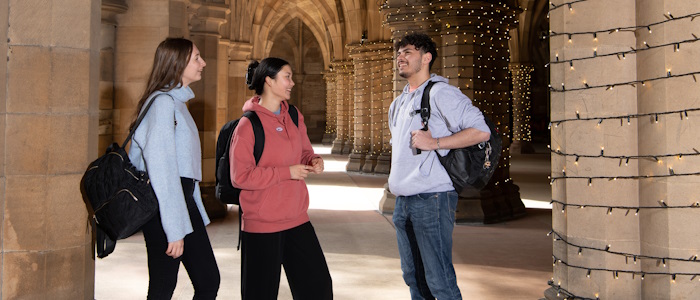Information for applicants
About our degree programmes
Computing Science and Software Engineering are fast-moving, exciting fields covering theory (like algorithms), experiments (e.g. human-computer interaction), and practical software design and implementation.
Our degrees teach core computing principles that last, such as problem-solving and algorithm analysis, while giving you hands-on experience with current tech through projects and placements.
We focus on teaching you how to learn and adapt in a rapidly changing industry, not just specific tools. Graduates enjoy excellent career prospects, working in diverse areas from healthcare and music to sustainability and global business.
First-year courses welcome all levels of programming experience, with two routes tailored for beginners or those with prior skills. Our School is a UK leader in research and teaching, with strong industry connections that prepare you for success.
Undergraduate degree pathways
We offer four-year BSc (Hons) and five-year MSci programmes in Computing Science and Software Engineering. Accelerated three- and four-year “faster route” options are available for high-achieving students with prior computing experience.
Faster routes require familiarity with fundamental programming and include an extra Level 2 Computing Fundamentals course. Due to the intensive curriculum, faster route students cannot take a second subject or switch majors easily.
The MSci Software Engineering includes an optional full-year placement in the fourth year.
Joint Honours degrees in Electronic & Software Engineering are offered as BSc, BEng, or MEng. Combined Honours with subjects like Business, Geography, Mathematics, Physics, Psychology, and Statistics are also available, along with MA options in Arts & Humanities or Social Sciences.
After Level 2, students choose single, combined, or joint honours pathways. Non-honours degrees are available after three years.
Combined degrees
You can combine Computing Science with subjects such as Business & Management, Geography, Mathematics, Physics, Psychology, and Statistics (BSc Combined Honours). MA and MA (Soc Sci) options are available through other Colleges.
Excellence scholarships for international students
We offer guaranteed £5,000 per year scholarships to international students who meet entry requirements for our faster route Computing Science and Software Engineering programmes. No application is needed. Glasgow International College articulators are excluded.
Eligibility requirments include:
- International fee status
- Offer for a single honours or integrated Masters faster route programme
Professional accreditation
Our UK undergraduate programmes are accredited by the British Computer Society (BCS), the leading professional body for IT.
- Honours degree graduates
- Can become Chartered IT Professionals (CITP)
- Partially meet the requirements to become Chartered Engineers (CEng)
- MSci (Integrated Master’s) graduates
- Fully meet the requirements to become both Chartered IT Professionals (CITP) and Chartered Engineers (CEng)
Additionally:
- Our Honours degrees hold the Euro-Inf Bachelor Quality Label
- Our MSci degrees hold the Euro-Inf Master Quality Label
These accreditations recognise the quality and rigor of our programmes and support your professional registration and career progression.
Frequently asked questions
- What programming language(s) will I learn?
- Is it possible to transfer into the second year of your degree programme?
- Does your School support Erasmus exchanges?
- Does your School support International exchanges?
- What level of English proficiency is required for studying in the School of Computing Science?
What programming language(s) will I learn?
- In level 1 you will learn to program in Python, a popular modern multi-purpose language.
- In level 2, we teach you how to program using Java. The focus in level 2 is on object-oriented programming techniques. We also introduce web-based development with Javascript and related technology.
- In level 3, you will learn the C programming language and, perhaps, another programming language via your team project. By the end of level 3, you should be able to pick up a new programming language that you haven't seen before and become sufficiently skilled to be a productive user of it in a couple of weeks.
- In levels 4 and 5, you will use a variety of programming languages in your elective course and in your individual project. Amongst the languages you might use are Haskell, C#, C++, Objective C, and Smalltalk.
Is it possible to transfer into the second year of your degree programme?
- Highly qualified candidates, who have an A in Computing or equivalent at Higher or A Level, can apply for direct entry into second year or into a special level 2 "Faster Route" program. Normally, direct entry requires an HND in Computing or equivalent. The "Faster Route" route is designed for applicants direct from school with appropriate Higher, A-level or IB qualifications.
Does your School support Erasmus exchanges?
- Yes, we do. However, this is only available for a selected set of European universities. For more information please visit https://www.gla.ac.uk/schools/computing/international/studyabroad/. Also please don't hesitate to contact us for further information.
Does your School support International exchanges?
- Yes, we do. Going abroad can provide you with an exciting opportunity to see other parts of the world whilst studying for your degree. For more information please visit our Study Abroad and Exchange pages. For further information, please don't hesitate to contact us.
What level of English proficiency is required for studying in the School of Computing Science?
- Proficiency in English is a pre-requisite. For applicants whose first language is not English, the University sets a minimum English language proficiency level: this can be found in the Entry requirements tab of each of the programmes listed.

UG offer holders



